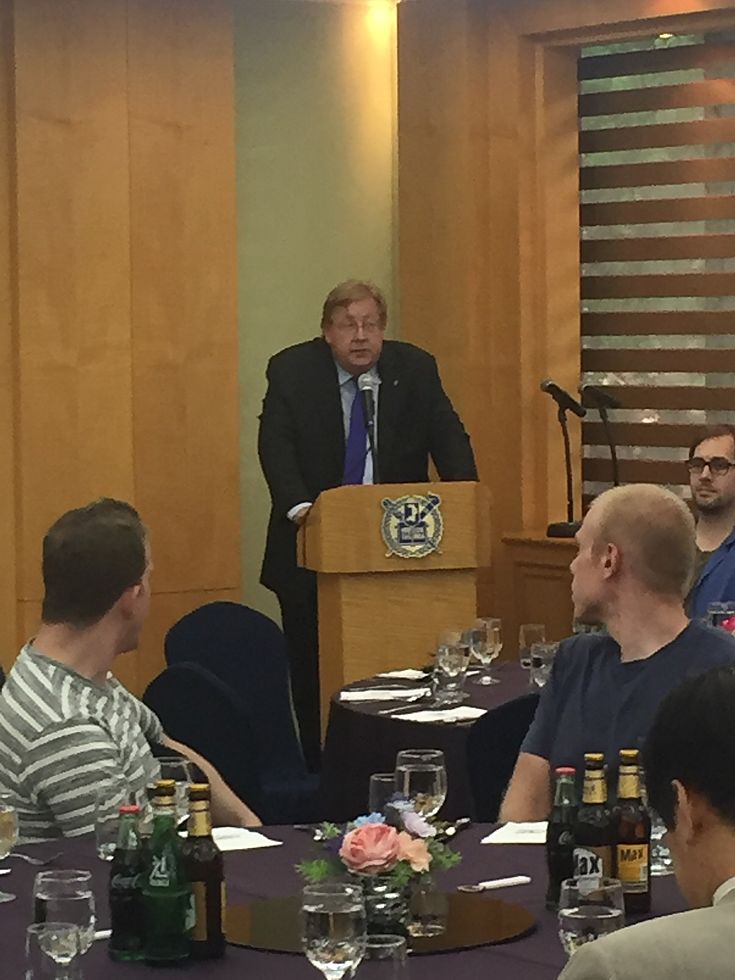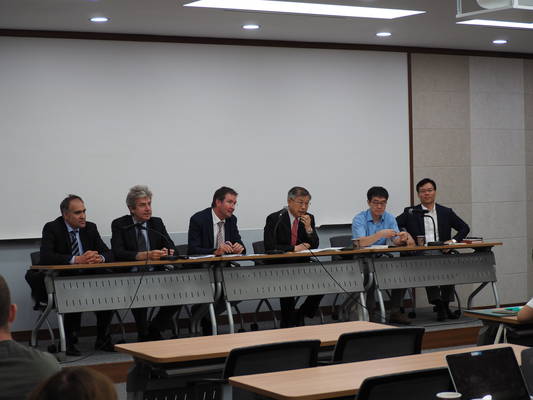Workshop: Political Transformation and Democracy in Germany and Korea
The dinner speech was held by Dr. Seliger, head of the Hanns Seidel Foundation Korea Office
As a result, the Hanns Seidel Foundation Korea in cooperation with the University of Rostock, the Institute for Peace and Unification Studies (IPUS) of Seoul National University and the Ewha Womans University, was glad to invite participants to join the workshop: “Political Transformation and Democracy in Germany and Korea” in the Hoam Faculty House at Seoul National University. The two-day workshop was held from July 8th – July 9th 2016 and was also attended by a delegation from Germany as part of the Summer Academy Re-Unification (SARU) between the Ewha Womans University and the University of Rostock.
Germany was the focus on the first day of the workshop which started with opening speeches by Prof. Dr. Stefan Creuzberger and Prof. Dr. Nikolaus Werz from the University of Rostock and with a speech by Prof. Park Ihn-Hwi from Ewha Womans University. Prof. Dr. Creuzberger remarked that especially the exchange between Korean and German students as part of the summer school would provide the opportunity for German students to get a better understanding of their own history as a divided country and that the exchange should be continued in the future. Prof. Dr. Werz stressed that Germany took a unique position during the transformation in Europe during the transition period between 1980 and 1990. Prof. Park finished the introduction by commenting on the importance of reunifications of countries such as Germany and Vietnam of Korean leaders such as Park Chung-Hee.
The first Panel was opened by a presentation from Prof. Dr. Creuzberger which focused on the Soviet perspective during German reunification and especially the role of Gorbachev and his administration. The second statement was made by Prof. Dr. Dierk Hoffmann from the Institute of Contemporary History Munich/Berlin. He concentrated on the internal factors of Germany’s reunification such as the economic and social aspects, giving a detailed insight into factors like the monetary union but also the consequences of unification on the former GDR areas and its institutions. Dr. Michael Bienert, from the Ernst-Reuter-Foundation, talked about the symbolic importance of Berlin during the division and reunification of Germany and how the city was able to survive in the middle of the Soviet occupation zone.
From left to right: Prof. Dr. Markus Rehberg, Prof. Dr. Nikolaus Werz, Prof. Dr. Stefan Creuzberger, Prof. Lee Kyu Young from Sogang University, Prof. Lee Hye-Jung from Chung-ang University and Prof. Park Ihn-hwi from Ewha Womans University holding the final roundtable of the workshop
Dr. Markus Rehberg, of the University of Rostock, opened the second panel of the workshop. His presentation emphasized the legal aspects of unification such as the role of the German “Grundgesetz” (Basic law) and the German border guard cases amongst others. Prof. Dr. Nikolaus Werz held the next presentation with an emphasis on German Federalism and the effects reunification had on the various federal states, taking the federal state of Mecklenburg-Western Pomerania as the point of focus. The last speaker of the first day of the workshop, Prof. Dr. Friedhelm Meyer zu Natrup, also from the University of Rostock, shared his views about Germany’s geopolitical role and understanding in the world before and after reunification and the current EU integration process. According to his opinion, Germany is the reluctant leader of Europe, an attitude which has manifested itself due to its historic responsibilities.
At the end of the first day of the workshop the participants were invited to an evening dinner. During his dinner speech, Dr. Seliger, representative of Hanns Seidel Foundation Korea office, stressed the environmental problems North-Korea is currently facing especially due to deforestation and also elaborated on the current status of the North-Korean regime and its leader Kim Jong-Un. He finished his speech by commenting on the importance of workshops like these and that cooperation with North-Korea is fundamental to build up trust and cooperation between all sides.
The second day of the workshop focused on Korea with the opening remarks held by Prof. Jung Keun-Sik the head of the IPUS-SNU. The subsequent third panel of the workshop began with a presentation by Prof. Han Jeong Hun from SNU. Prof. Han talked about Korea’s experience with development and democratization and the Korean people’s trust in the current democratic institutions. He concluded that his findings would support the theory that the social division in Korea won’t prevent democratization, but that party affiliation might ultimately have a negative influence. Prof. Kim Jaechun from Sogang University was the last speaker of the panel. He elaborated on Korea’s role during globalization over the years. According to him South Korea has realized that hard power is just as important as soft power, but that the geostrategic location in Asia makes things complicated for South Korea. Also, unification could be the solution to many of the problems associated with North-Korea like the nuclear weapons issue but also internal North-Korean problems like environmental degradation.
The fourth and last panel of the workshop was opened by Prof. Park Young Ho from the Korea Institute for National Unification. His presentation dealt with Korea’s current national power and development and he also gave predictions on how unification could influence these factors. The last presenter, Prof. Jeong Hyung-Gon from the Korea Institute for International Economic Policy (KIEP), concentrated on the difference in economic performance among the transition economies in the former Eastern Bloc and which conclusion could be drawn from these differences for the economic development of North-Korea. According to his findings the only way for North-Korea to escape poverty is a “transition from its rigid socialist economy to a market economy”.
The workshop was wrapped up by a roundtable discussion between professor Park, Creuzberger, Werz, Rehberg and professor Lee Hye-Jung from Chun-ang University with Prof. Lee Kyu Young from Sogang University being the moderator. The roundtable focused on the question if Germany could be used as a Blueprint for Korean Re-unification. In general, all participants agreed that the different circumstances regarding the German and Korean cases makes it difficult to see Germany as a good blueprint for Korean unification. Nevertheless, the German reunification could offer important insights about mistakes made during said process which in turn could have a positive impact on a possible Korean unification process.


